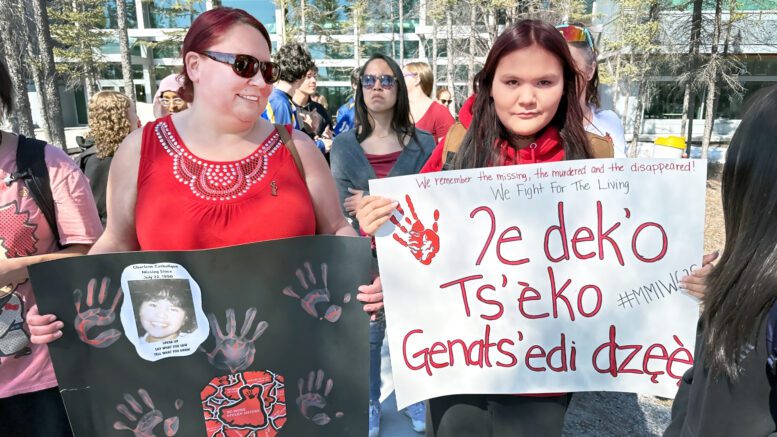“We must remember and share the heartbreaking stories, memories and pain that was felt by survivors and family members are missing and murdered indigenous women and girls and to LGBTQ people. We must continue to tell the story of every missing and murdered indigenous women and girls.”
– Elizabeth Biscaye, director of the GNWT’s Gender Equity Division
Some 300 people marched through downtown Yellowknife on a Monday lunch hour in recognition of Red Dress Day, many carrying photos of loved ones who were victims of violence.
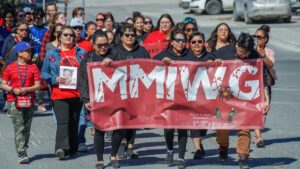
Marchers head down 51st Street Monday over the lunch hour to mark Red Dress Day. (James O’Connor/CKLB)
The march started at the NWT Legislative Assembly at noon, walked past the Prince of Wales Northern Heritage Centre and through trails until hitting 51st Street and down to the Tree of Peace Friendship Centre.
Elizabeth Biscaye spoke at the start of the march standing in front of the Missing and Murdered Indigenous Women and Girls Monument to missing and murdered Indigenous women and girls unveiled last fall.
“For those not familiar with the significance of red dress day. Red Dress day was started in 2010. And it is meant to bring awareness about missing and murdered indigenous women and girls and to LGBTQ plus people.,” she said.
“The red dresses are hung symbolically to represent Indigenous women and girls who have gone missing or were murdered. The red dresses are a stark reminder of what our indigenous sisters have to continue to endure to this day.”
Smoke from a campfire in the monument’s shadow wafted through the crowd, which was a well-stirred mix of ages, genders and ancestries. Elders stood alongside a group of high school students, some wearing the team jerseys.
Deputy Premier Carolyn Wawzonek was previously minister responsible for the Status of Women and, prior to entering politics, was a lawyer deeply involved with the National Inquiry into Missing and Murdered Indigenous Women and Girls (MMIWG) which led to the Final Report and the 231 calls for justice.
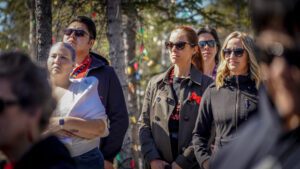
A solemn Deputy Premier Caroline Wawzonek, with the red dress lapel pin, at the start of the march at the NWT Legislative Assembly on Red Dress Day. (James O’Connor/CKLB)
“Just wanting to be a part of this community, obviously a political representative, but as a member of the community, I wanted to come out and have an opportunity to gather,” said Wawzonek, who identifies as Metis.
“Yes, so I’m really excited. It’s a good turnout. But I’m particularly moved to see a lot of young people (and) high schoolers wearing their school colours. I just thought that was quite nice. I mean, that’s how we’re gonna actually ultimately have the longer-term change.”
Many in the crowd had personal stories of loss, pain and grief.
Such as Pearl Liske who brought her daughter Maykala Liske-Kotchilea to the march.
She is hopeful events such as the Red Dress Day marches across Canada will have some impact on the issue of violence and misery for Indigenous women.
“I mean, they didn’t have this 20 years ago, 10 years ago,” she said. “So, I hope people are aware of how important it is to make sure that everybody has felt love and is not neglected and that their home is where it’s supposed to be.
“That’s what I tried to provide for my daughter – to make sure she knows that she’s got a safe place and her friends have a safe place.”
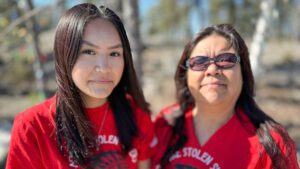
Maykala Liske-Kotchilea and Pearl Liske at start of Red Dress Day march. (James O’Connor/CKLB)
Fifteen-year-old Maykala said she knows how to avoid trouble. She avoids people she believes could harm her and she also does not hang out downtown.
Pearl has her own story of loss and grief, as her niece was killed at the age of 12.
“It was an ugly thing, she didn’t get to live her life,” she said.
While the crowd appeared largely Indigenous, there were many allies in the march, including Melissa Desjardins. Originally from New Brunswick, she’s with the military and now calls Yellowknife home.
She said events such as Red Dress Day are worthy and do help Indigenous people get their message out.
“I think it certainly helps to bring people together for a common goal and to share their experiences,” she said.
Holding a handmade sign in the Tlicho language, high school student Dahlia Simpson was with teaching assistant Crystal Catholique.
Catholique said by showing support and, “getting it known out there that people need to start speaking up because somebody’s seen something and somebody knows something. And if we don’t start sharing those voices, things will never get accomplished.”

Melissa Desjardins at start of march on Red Dress Day. (James O’Connor/CKLB)
The current Minister in charge of the Status of Women is Lucy Kuptana, who is from Tuktoyaktuk.
In a release, she used very sharp language to describe the situation Indigenous women face.
“Indigenous women face violence every day in the home, the workplace, and within our community. We lean on each other when times are tough and lend a helping hand to others in need. We are resilient,” read the release.
“As the backbone of our society, we find strength within ourselves to support our communities so our children and grandchildren do not become a statistic.
“We must work for a better world where Indigenous women and girls are valued and protected.”
For those who need support, you can reach out to the NWT Helpline at 1-800-661-0844. If the threat is immediate, call the RCMP at 9-1-1.
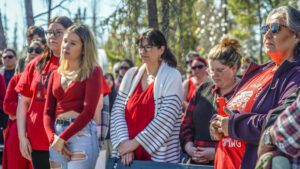
A wide range of ages were present at the Red Dress Day march Monday in Yellowknife. (James O’Connor/CKLB)
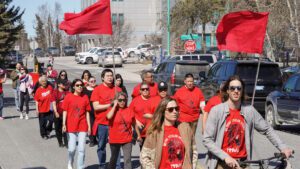
Red Dress Day marchers in downtown Yellowknife on Monday. (James O’Connor/CKLB)
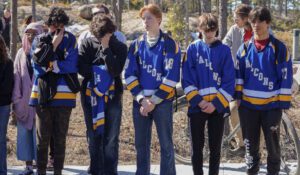
Some members of Sir John Franklin Falcons were directly downwind of the campfire at the start of the Red Dress Day march. (James O’Connor/CKLB)

